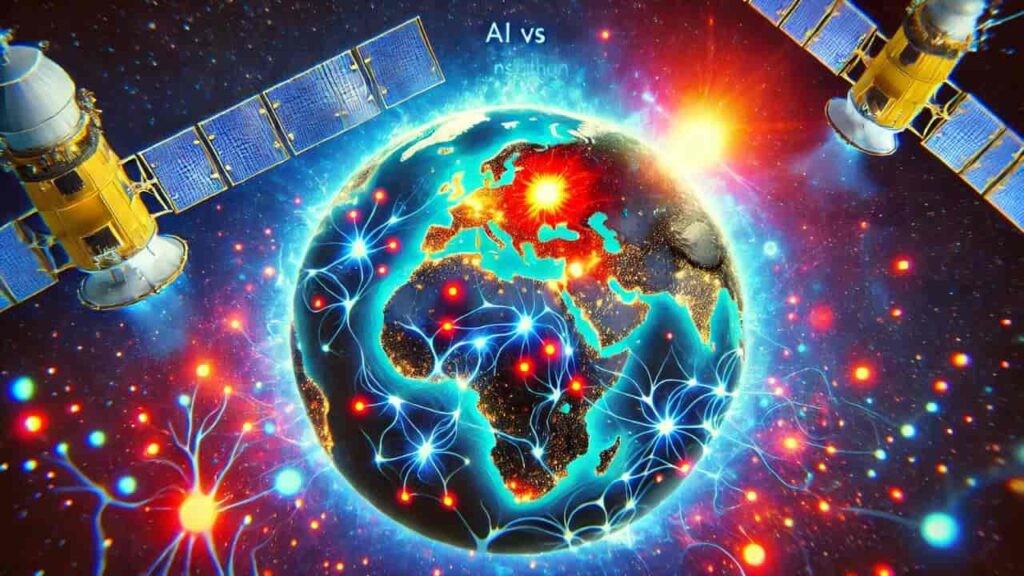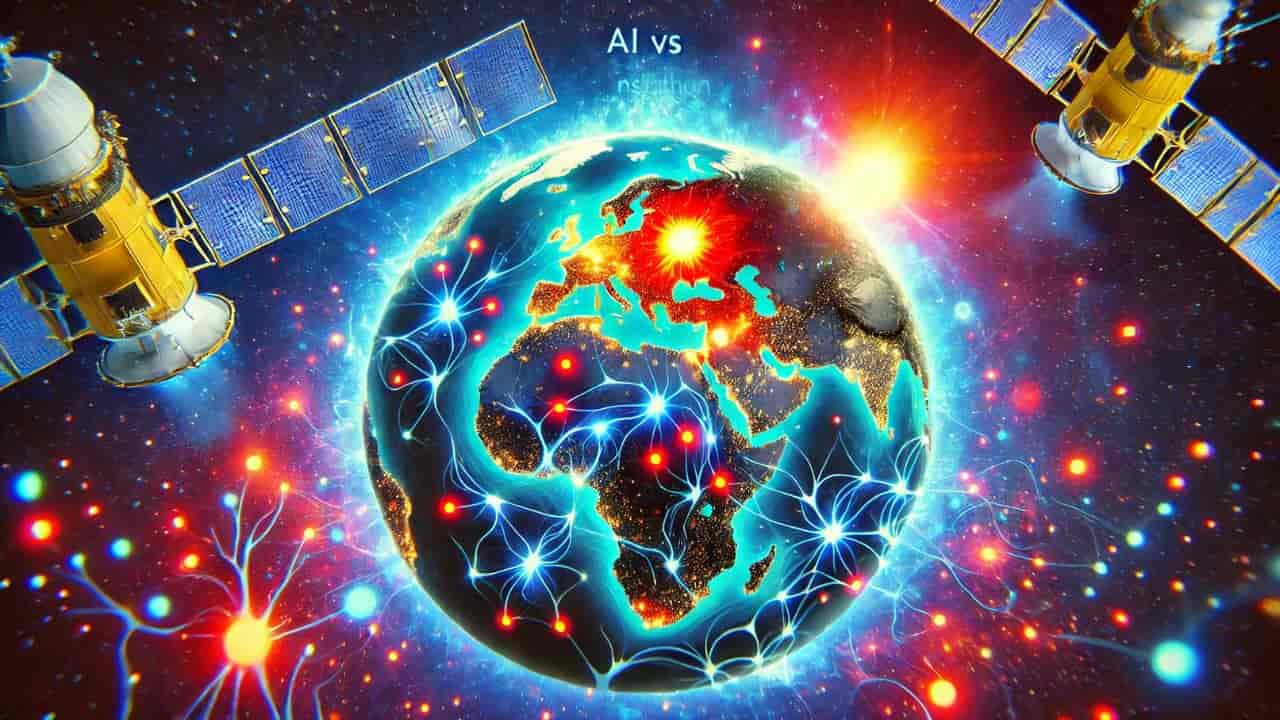AI methane detection, Geolabe AI technology, methane emission monitoring, NASA Entrepreneurs Challenge, climate change mitigation, artificial intelligence in climate science, methane leak detection
Discover how Geolabe, a NASA Entrepreneurs Challenge winner, is using artificial intelligence to revolutionize global methane emission detection, providing critical data to mitigate climate change

Harnessing AI to Tackle Methane Emissions: A Revolutionary Approach by Geolabe
In the battle against climate change, the significance of methane as a potent greenhouse gas cannot be understated. Methane is responsible for approximately a third of global warming, despite its relatively shorter lifespan in the atmosphere compared to carbon dioxide. This makes the detection and reduction of methane emissions a critical component in the global effort to mitigate climate change. The challenge, however, lies in the difficulty of accurately detecting and quantifying these emissions on a global scale. Enter Geolabe, a cutting-edge startup that has pioneered the use of artificial intelligence (AI) to address this issue, earning them a prize in the prestigious NASA Science Mission Directorate (SMD) Entrepreneurs Challenge.
The NASA Entrepreneurs Challenge: A Platform for Innovation
The NASA Science Mission Directorate (SMD) launched the Entrepreneurs Challenge to foster innovation among small business startups, providing them with opportunities to develop and scale technologies that align with NASA’s science goals. Since its inception, the Entrepreneurs Challenge has been a catalyst for groundbreaking advancements, particularly in fields such as mass spectrometry technology, quantum sensors, and metamaterials-based sensor technologies.
The challenge, which took place in 2020, 2021, and 2023, saw numerous startups vying for the coveted prize. In 2023, the total prize value reached $1 million, and winners were also given the opportunity to attract external funding from the venture capital community and other government agencies. This unique model of leveraging external resources has enabled many challenge winners to further develop their technologies, with several securing additional funding to bring their innovations to market.
Geolabe: A Success Story in the Making
One of the standout successes from the 2023 Entrepreneurs Challenge is Geolabe, a startup founded by Dr. Claudia Hulbert and Dr. Bertrand Rouet-Leduc in 2020. Based in Los Alamos, New Mexico, Geolabe has developed a revolutionary method that utilizes AI to detect methane emissions on a global scale.
As global temperatures continue to rise, the urgency to reduce greenhouse gas emissions has become more pronounced. Methane, being the second-largest contributor to global warming, has emerged as a key target for climate change mitigation efforts. However, the detection of methane emissions has been fraught with challenges, primarily due to the limitations of existing methods. Traditional detection techniques rely on specialized equipment, such as infrared cameras, to identify methane plumes. However, these plumes are often invisible and odorless, making them difficult to detect, especially from space.
The Challenges of Methane Detection
Monitoring methane emissions on a global scale presents several technical challenges. Methane plumes are not only difficult to detect due to their invisibility and lack of odor but are also dispersed across the globe in relatively small quantities. This makes it akin to searching for a needle in a haystack when trying to identify these emissions using satellite data. Moreover, the signal-to-noise ratio in multispectral satellite imagery, which has been a promising tool for methane detection, is extremely poor when it comes to detecting smaller emissions. As a result, traditional manual methods have only been able to detect very large emissions, typically in the range of 2-3 tons per hour.
Geolabe’s AI-Powered Solution
Recognizing the need for a more efficient and accurate method of methane detection, Geolabe developed a deep learning architecture that leverages existing open-source spectral satellite data. This AI-powered method deconvolves the signal from the noise, allowing for the automatic detection of methane leaks at a much lower threshold of 200kg per hour. This is a significant breakthrough, as it enables the detection of over 85% of methane emissions in well-studied, large oil and gas basins.
The implications of this technology are far-reaching. By providing accurate and timely data on methane emissions, Geolabe’s AI solution can inform policymakers and decision-makers, helping them to develop strategies to mitigate methane emissions effectively. Additionally, this technology can automatically validate the effectiveness of mitigation efforts, ensuring that actions taken to reduce emissions are having the desired impact.
Recognition and Impact
Geolabe’s innovative approach has not gone unnoticed. The project was prominently featured in the esteemed journal Nature Communications on May 14, 2024, highlighting its potential to revolutionize the way methane emissions are monitored and managed on a global scale. This recognition is a testament to the hard work and dedication of the Geolabe team, as well as the transformative potential of AI in addressing some of the most pressing challenges of our time.
The Role of the Entrepreneurs Challenge in Driving Innovation
The success of Geolabe underscores the importance of initiatives like the NASA Entrepreneurs Challenge in driving technological innovation. By providing a platform for startups to showcase their ideas and connect with external funding sources, the challenge has become a vital component in the advancement of technologies that address critical issues such as climate change.
The involvement of the venture capital community in the Entrepreneurs Challenge has also been a key factor in the success of many startups. By attracting external funding, challenge winners have been able to scale their technologies more rapidly, bringing them to market faster and amplifying their impact. This model of collaboration between government agencies, startups, and the private sector is a powerful example of how innovation can be accelerated through strategic partnerships.
Conclusion
Geolabe’s AI-powered methane detection technology represents a significant leap forward in the fight against climate change. By leveraging the power of AI, Geolabe has developed a method that can detect methane emissions more accurately and efficiently than ever before, providing critical data to inform mitigation strategies. The success of Geolabe is a testament to the transformative potential of AI and the importance of initiatives like the NASA Entrepreneurs Challenge in fostering innovation. As we continue to face the challenges posed by climate change, technologies like those developed by Geolabe will be crucial in our efforts to protect the planet for future generations.
Read More
- NASA and Sierra Space Dream Chaser Arrives in Florida for Launch Prep
- NASA Webb Telescope Hints at Possible Atmosphere Surrounding Rocky Exoplanet
- NASA’s Select Terrain Vehicle for Artemis Missions
- NASA Awards 2023 Nancy Grace Roman Technology Fellowships to Five Astrophysics Innovators










